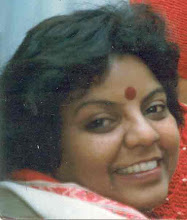
Breaking caste bonds
Nirupama Dutt
"Our village is very beautiful." This was the opening line of 'Kurukku', the childhood memoirs written in Tamil by Dalit writer Bama. 'Kurukku', (which in Tamil means the sharp-edged stem of the palmera tree) voiced the joys and sorrows of her people, oppressed by higher castes in India. "We were very poor. I was witness to many instances of violence against Dalits. I also saw the humiliation my grandmother and mother faced in the fields and homes of the landlords. Despite the misery, we had a carefree childhood."In 2001, Lakshmi Holmstorm's English translation of 'Kurukku' won the Crossword Award in India and established Bama as a distinct voice in Indian literature. (Dalits are members of India's most marginalized and oppressed castes.)Bama didn't really plan to be a writer. Born in 1958 as Faustina Mary Fatima Rani (her grandfather had converted to Christianity) in a village called Puthupatti in Tamil Nadu (southern India), her landless ancestors and parents worked as laborers for the landlords. She and her four siblings spent a lot of time playing in the fields. "Sometimes we were cops and robbers, sometimes husband and wife. But my favorite game was kabaddi (a team wrestling game played in many Indian villages). I liked the whole business of challenging, crossing over and vanquishing the opponent," says Bama, recently in New Delhi to attend a writer's meet.Perhaps it was this game which trained Bama to face many challenges in life and come out victorious. Bama's father, who was in the Indian army, was very particular about the children's education. "If he had not joined the army, we would never have had the regular income for education. Education also gave us freedom to get away from the clutches of the landlords and lead our own lives," says Bama.Her brother Raj Gautaman, also a writer, introduced her to the world of books. "I read Tamil writers like Jayakantan, Akhilan, Mani and Parthasarthy. In college I read my favorites - Kahlil Gibran and Rabindranath Tagore. I didn't have many books to read so I read the same ones again and again," she recalls. In college she also wrote poetry. But after college Bama became a schoolteacher and chose to educate very poor girls.Her life took a big turn when at the age of 26 she took the vows to become a nun. This was an attempt to break away from caste bonds and further pursue her goals to help poor Dalit girls. "I felt that at the seminary I would be able to carry forward my work with the poor," she says. But seven years later, in 1992, Bama walked out of the seminary. Her family insisted she get married and settle down. "I had lost everything. I was a stranger to society. I kept lamenting about life and harked back to my happy childhood days in the village," narrates Bama.Struggling to find herself again, Bama followed a friend's advice and started to write her childhood memoirs. She also created her pen name - Bama - a blend of different sounds from her Christian name. She completed the book in six months. This slim volume, a semi-fictional account of the growing awareness of a Dalit, created a stir in literary circles for its uninhibited language and bold vocabulary. "Some critics cried out that a woman should not have used such coarse words. But I wrote the way people speak. I didn't force a literary language on myself," says Bama. Today, at 45, Bama teaches in a primary school in Uthiramerur, near Chennai, capital of Tamil Nadu. Her works, which include two collections of short stories, 'Kissubukkaran' and 'Sangathi', have also been translated into French. Though Bama began by writing about the condition of Dalits in rural India, she now plans to focus on communal clashes.After school, Bama spends most of her time talking to young Dalit women about religion, oppression and social change. She shares her experiences as a student, nun and a writer to encourage them to build something anew.Why did she choose to remain single? "The existing family system would not give me the space I needed to do my kind of work. So I chose to stay single," she explains. "My ambition is to communicate the dreams and aspirations of my people, who have remained on the fringes for centuries in Indian history."
March 16, 2003, Women's Feature Service

3 comments:
it is high time women reacted against the patriarchal domination of indian society. and in the writings of Bama one can find the boldness and stong mind of a dalit woman who openly criticizes the elite in the society who have been oppressing them for centuries. 'kurrukku' is a commendable work by Bama. Let she get more courage and strength to pen more about the atrocities shown towards dalits.
Bama’ is one the most important dalit voices writing in Tamil. Her works caused a great deal of discussion and cast a new light on the plight of dalits, especially even after they converted to Christianity, where they still faced the same untouchability. Her works are also critical of the Chruch and the way it discriminates against dalits who have converted to Christianity. Bama herself was in a seminary before she left it disgusted by the double standards there too.
We want to use one of your image for academic purpose (non-commercial use) at ILLL University of Delhi (India), therefore we need copyright permission for the same. URL of the Image is given below:
http://nirupamad.blogspot.in/2008/10/writer-called-bama.html
Post a Comment